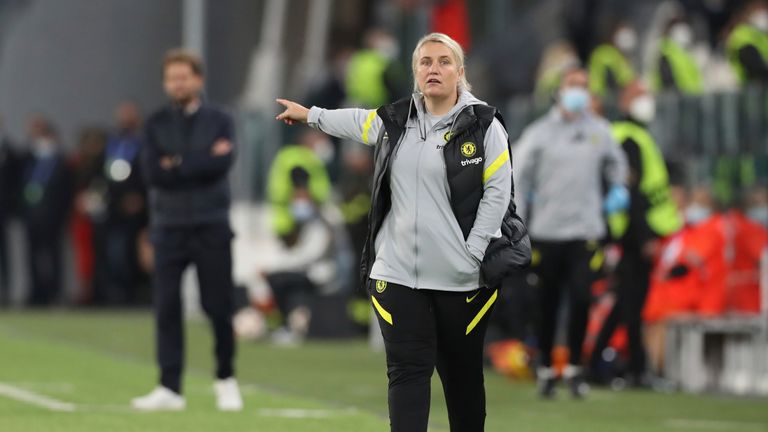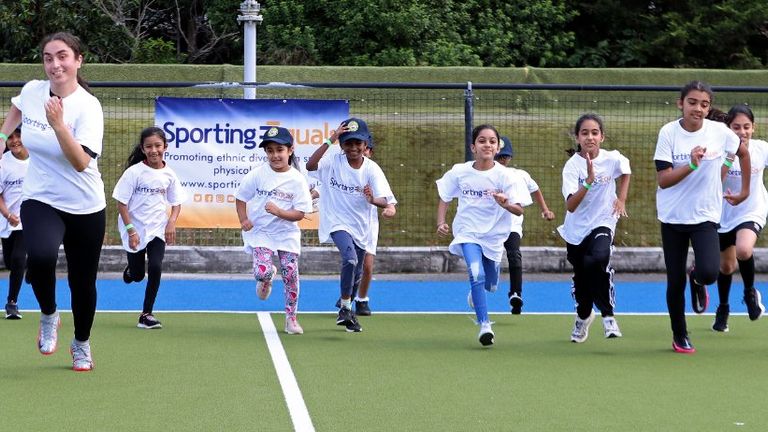Premier League to invest more than £5m over three years in FA's new network of girls' football talent centres
Premier League to invest more than £5m to fund new Emerging Talent Centres to increase number of eight to 16-year-old girls receiving high-quality coaching; follows FA review of current pathway structure with better accessibility and greater inclusion identified as areas to improve
Tuesday 12 July 2022 10:11, UK
The Premier League will fund the Football Association's new network of Girls' Emerging Talent Centres (ETCs) with more than £5m over the next three years.
The Premier League will invest a total of £5.25m - £1.75m each year for the next three years - in the new centres. There are currently 29 Regional Talent Clubs and 10 Advanced Coaching Centres nationwide, catering for 1,722 girls.
The plan is to create up to 70 ETCs across the country that are open for eight to 16-year-olds, aiming to offer high-quality coaching to 4,200 girls by the end of the 2023/24 season.
- Transfer Centre LIVE!
- Get Sky Sports | Download the Sky Sports App
- Women's Super League fixtures | Table
In 2020, the FA pledged to provide a well-signposted, inclusive and accessible club player pathway that supports talented girls and young women.
FA head of women's technical Kay Cossington, said: "We've undertaken a lengthy and comprehensive review of the current pathway structure, and this has provided a clear future direction, based around five key areas of improvement, which all our new Emerging Talent Centres will embody.
"We're also delighted to be working with the Premier League to support the delivery of the new Emerging Talent Centres."
Premier League Director of Football Neil Saunders added: "Premier League clubs are doing more than ever to support the growth of women's and girls' football and we are pleased to be working alongside The FA to provide funding for the new Emerging Talent Centres.
"The centres will provide more opportunities for girls across the country to access enhanced coaching and will develop pathways within the professional and grassroots game, benefiting young players and clubs alike."
The FA has identified five areas of improvement to its player pathway: better accessibility, more inclusivity, reducing the impact of early selection, more focused investment, and providing more appropriate challenges.
ETCs will be run by affiliated football clubs playing in the top four tiers of the Women's Football Pyramid, Club Community organisations linked to league and National League clubs, and County FAs and FA Women's High-Performance Centres.
Sporting Equals: South Asian representation 'not good enough'
Speaking at the launch of the partnership between the country's largest sports race equality charity Sporting Equals and Sky Sports,Sporting Equals chief executive Arun Kang said it is important for football to consider the interests of South Asian women in the game, adding top-flight representation is nowhere near where it should be.
Active Lives survey data has consistently shown that South Asian women are the least physically active group in the country, and just 0.3 per cent of players in the top division of English women's football, the FA Women's Super League, hail from the British South Asian community.
"South Asian women in the game are really important," Kang told Sky Sports News.
"I think 0.3 per cent [British South Asian representation] in the WSL isn't good enough at the moment. I know there are many South Asian women and girls who are playing football [at a high standard] and we need to bring them on board.
- Jhamat weighs up Bristol City future | Kaur has bright future
- Millie Chandarana: I've come full-circle at Blackburn
- Bala Devi: Indian sensation opens up on Rangers stint
"One of the key parts of this project itself is going to be work on research and insight, finding out where many South Asian women and girls are playing at the moment, and which clubs they are with.
"We know a lot of them anyway because they have engaged with us, with Sky, with Sporting Equals, which is also going to be very important to this as well. We need all of them on board and we want to really collect that data for the game.
"And then the key isn't just to take the data and put it on a shelf, it's about tracking those individuals and finding out where they are going next. What have they done? Why did they stop? What were the barriers and challenges that stopped them moving and progressing through the game?
"I think that's what we want to be working with the individuals, and the clubs themselves on, and with football as a sector."







